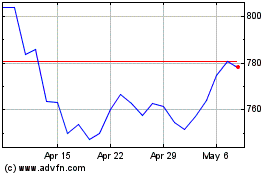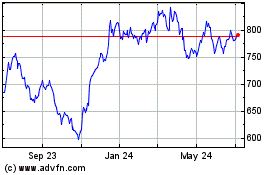By Liz Hoffman and Geoffrey Rogow
Wall Street's role as matchmaker between big money managers and
corporate executives is under threat.
Next year, five large investing firms overseeing more than $7
trillion are banding together to directly organize a series of
meetings with company executives, according to people familiar with
the matter. The first meeting, set for Boston next spring, will
host executives of consumer-staples companies.
The existence of the meetings is a direct threat to the millions
of dollars in fees banks make each year introducing their investor
clients to the managers in whose companies they own stock. Fund
managers pack into hotel ballrooms to hear presentations and take
guided tours of company factories. A one-on-one meeting with a
chief executive can run $50,000 or more in some cases.
Now, some of the biggest managers are planning to go it alone.
No banks needed, or even invited.
Fidelity Investments, Capital Group, Wellington Management, T.
Rowe Price Group Inc. and Norway's government fund are planning a
series of private conferences where their analysts can meet CEOs,
according to people familiar with the matter. The agenda: cocktails
and dinner, followed by a full day of one-on-one meetings, 75
minutes each. CEOs only.
"We plan to partner on corporate access events and conferences
that will provide a tailored research experience for our
investors," a spokeswoman for T. Rowe said.
The workaround is just the latest way that banks are losing
their spots as Wall Street's indispensable middlemen. They once
underwrote loans, stood in between buyers and sellers of
securities, and organized meetings between investors and corporate
executives -- all for hefty fees.
Today, companies are increasingly borrowing straight from loan
funds, without hiring a bank to underwrite and place the debt.
Online platforms allow investors to trade directly with each other,
sidestepping a bank's trader. Solo advisers help companies design
complex derivatives for a fraction of what Goldman Sachs Group Inc.
or JPMorgan Chase & Co. would charge.
Corporate access is one of the few cash cows left for banks and
their research departments. Greenwich Associates estimates that
corporate access was worth $900 million to banks last year, about
12% of their total equities revenues. It can also spur trading
revenue and draw corporate clients closer.
The average big U.S. company sent executives to six investor
conferences and on five roadshows in 2017, where they typically met
with investors curated by a bank research department, according to
data provider IHS Markit.
Chief executives get the chance to tell their stories to
sometimes skeptical audiences and soften up the ground for shifts
in direction. These meetings are generally unrecorded, with
analysts taking notes that they may later disseminate, in edited
form, to other clients.
Executives are forbidden from sharing nonpublic information at
closed meetings, but investors focus on their body language and
parse their words in the hopes of picking up a useful nugget or
two. A 2011 study found that fund managers who took corporate
meetings made more money than peers who didn't.
The practice traces to 2003, when Wall Street securities firms
paid $1.4 billion to settle allegations that they routinely issued
overly optimistic stock research to flatter corporate clients and
win their investment-banking business. Regulators forced banks to
wall-off their research departments from their dealmakers.
So analysts turned to the access business, finding another way
to profit from their ties to big companies. In the year following
the settlement, at least eight firms set up dedicated units to
arrange intimate meetings between investors and corporate brass.
Some charged fees for entry; others sought to curry favor with
funds that might send more trades their way.
Banks have been relying more on that business recently as
trading commissions have dwindled and a shift to passive, indexed
investing has hit banks' trading desks hard. The dense financial
reports their analysts produce are less relevant as computer-driven
"quants" and index funds displace traditional stock-pickers.
Consulting firm Oliver Wyman expects banks to lose as much as $3
billion as asset managers cut back on research spending. Charging
for corporate meetings helps compensate. Investment banks are now
required by new regulation that began in Europe to tell their
clients how much they are charging them for research, rather than
bundling its cost in with trading commissions.
But their asset-manager clients are similarly under pressure.
The race toward low-fee funds pioneered by Vanguard Group and
BlackRock Inc. -- two giants notably absent from this latest effort
-- has forced rivals to slash costs, cut jobs and even move their
corporate headquarters to cheaper locations.
As ownership has become more concentrated in the hands of a few
asset managers, some investors question the need to have banks in
the middle at all. Just four firms -- BlackRock, Vanguard, Fidelity
and State Street Corp. -- were the largest shareholders in nearly
90% of the companies listed in the S&P 500 at the beginning of
2018, according to Brookings Institution.
The conference being organized by the five firms could threaten
popular conferences hosted by banks including Barclays PLC and Bank
of America Corp. The latter's is historically held in March, around
the time Fidelity, T. Rowe and the others will gather in
Boston.
Write to Liz Hoffman at liz.hoffman@wsj.com and Geoffrey Rogow
at geoffrey.rogow@wsj.com
(END) Dow Jones Newswires
June 26, 2019 09:46 ET (13:46 GMT)
Copyright (c) 2019 Dow Jones & Company, Inc.
BlackRock (NYSE:BLK)
Historical Stock Chart
From Mar 2024 to Apr 2024

BlackRock (NYSE:BLK)
Historical Stock Chart
From Apr 2023 to Apr 2024
